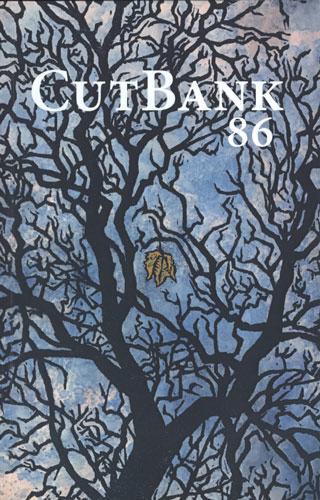CutBank – Spring 2017
If you appreciate finely-crafted stories that draw you into their worlds so that you become unaware of yourself as a physical being, then you will want to read this issue of CutBank. The poetry, nonfiction, and fiction pieces blend language and form in such ways that permit them to exist somewhere in a writerless universe where they come into being, yet seeming to have always been there. The writing is done with such skill and attention that makes it possible for readers to be unaware of the writing in a metaphysical sense. For me, this is the best type of writing: work that does not draw attention to itself as writing but rises above its own existence to breathe the air of higher altitudes; readers enter this oxygenated space for the duration.
If you appreciate finely-crafted stories that draw you into their worlds so that you become unaware of yourself as a physical being, then you will want to read this issue of CutBank. The poetry, nonfiction, and fiction pieces blend language and form in such ways that permit them to exist somewhere in a writerless universe where they come into being, yet seeming to have always been there. The writing is done with such skill and attention that makes it possible for readers to be unaware of the writing in a metaphysical sense. For me, this is the best type of writing: work that does not draw attention to itself as writing but rises above its own existence to breathe the air of higher altitudes; readers enter this oxygenated space for the duration.
The deft changes in settings in the short fiction of this issue add a richness to the narratives that has become a hallmark of modern literary fiction. Michael Parker’s “I Got a Line on You” moves with subtlety back and forth in time to just before and after “Hope touched the train.” Parker makes these shifts seem easy and navigates the reader through a narrative that eventually asks: “Don’t you remember how we did things just to get them out of the way?” making what might shock into something expected and almost ordinary.
Similarly, Lacey Rowland’s “Heroes and Villains” takes the reader through memories and scenarios about the narrator’s father after his death. She tells us “When people die, you learn things you never knew before.” The story is a beautiful eulogy in which memory, illusion, and reality comingle in a portrait of a father who “could make things disappear. Heartache, tears, a quarter behind the ear. A bottle of bourbon. Paychecks.” This opening description presents the reader with a rich character that is revealed throughout the story, laid bare in each compelling vignette.
In his weekly New York Times Magazine column, Matthew Zapruder writes about a poem he selects each week. In one column, he describes the poems of Tomaz Salamun and says that they “are not designed to be interpreted but instead act upon us.” This is how I feel about the poems in this issue of CutBank. The language of each poem acts upon me in a compelling way, and I am encouraged to read them aloud and silently over and over again.
Patrick Kindig’s “Diagram with a Line from Deleuze & Guattari” compelled me to look up the names, which led to an afternoon of reading about the lives of the philosopher and psychiatrist so that I might understand the poem on a deeper level as indicated by the title. The poem is a lovely and unrestrictive narrative containing language that moves from places to ideas “always arriving” and seems to be “a measure / of the space between / one life & another.”
The narratives in Rae Winkelstein’s poems are more elusive and act in a different way. Language is central and fluid and is often unsure of place. The reader is required to make connections with language that leaps and travels:
I am the receder of ponds, I stand still at the main frent
A darker mesh misleafing in the reeds: silica shreds
Are you ready, bristled Oh all with purpose
From the neck down: Equisetum are you merely willing . . .
These lines are a surreal journey that forces the reader to participate actively in Winkelstein’s poem and become part of the language experience. In another poem by Roxanne Banks Malia, images play a major role in the action and interpretation remains outside of the experience of the poem. In her “Dust Bowl Wedlock,” Malia combines images of fields and seas and uses language in unexpected ways to full effect:
Mud and horsehair
shredded foundation
falls like cloth and dawns
the barn abandoned.
These lines evoke images of sepia dust bowl photographs that provide a distinct mood to the poem, just as each of these poets has produced work that acts upon readers in specific ways.
This issue of CutBank is one to read cover to cover without leaving any piece unread, and the interview by Nicole Roché with Pulitzer Prize winner Gregory Pardlo is a not-to-miss feature. He speaks of his process, acknowledging that he doesn’t start a poem “knowing where it’s going to go,” challenging himself with his own set of restraints in certain poems. His advice to students of poetry is “Find your superpower.” He has certainly found his. Reading this interview and issue of the journal was a serendipitous joy for me, and I am glad that it passed my way. I hope other readers will feel the same.
[www.cutbankonline.org]





